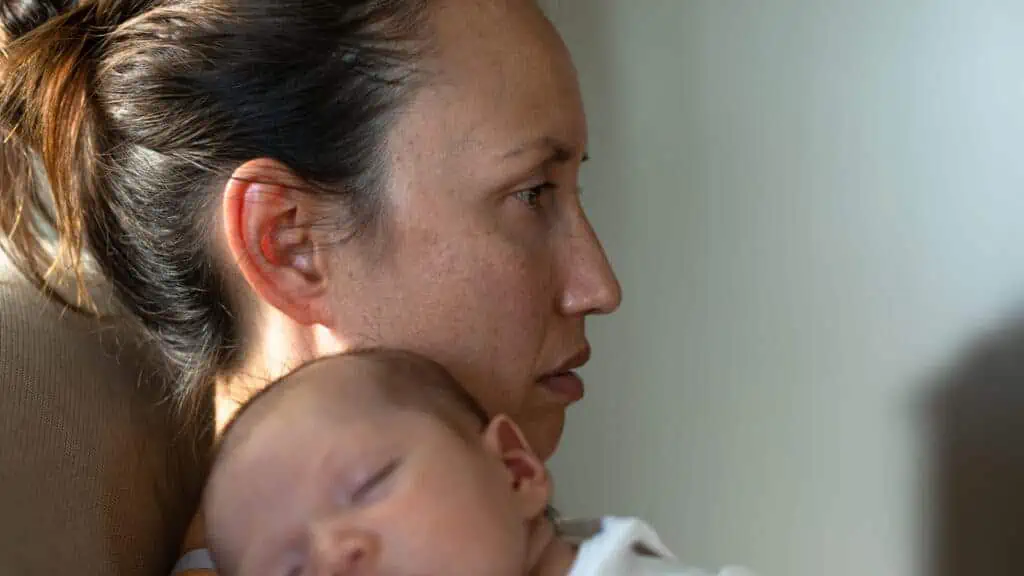7 Tips for Exhausted New Parents: How To Get An Overtired Baby To Sleep
This post may contain affiliate links. As an Amazon Associate, I earn from qualifying purchases.
Hands down, overtired babies can be the most frustrating thing in the world. They need sleep SO badly, yet they can’t seem to settle in, creating a cycle that exasperates both parents and babies. Ug, it’s no fun at all!
“Sleep like a baby” is such a frustrating misnomer. While brand-new babies tend to sleep a lot, baby waking will typically start to be more frequent as they engage with their new world.
Attention sleep deprived moms! (And dads) Let’s take a look at what causes overtired babies, the signs of an overtired baby, and how to help them fall asleep (and stay asleep) more soundly.
Baby Sleep Phases: From Newborn Sleepiness to a Tired Baby
In the first weeks, newborn babies are generally really sleepy. They’ll wake just to feed, get a quick nappy change, and generally fall straight back to sleep. Sleep can sometimes seem to just happen naturally and easily. But after a few weeks, they start to wake up, and too much awake time can quickly turn into an overtired baby.
They start naturally becoming more alert and aware, their wake windows are longer, and if not encouraged back to sleep regularly, they’ll be awake for much longer than they can handle.
If awake too long, they can slip into an overtired zone. Overtired babies have gone beyond the threshold of sleep, which can take a long time and become more difficult to soothe.
This article delves into identifying seven signs of overtiredness in babies, how to get them to sleep, and tips on how to prevent it from happening again with healthy sleep habits.

Signs Of An Overtired Baby
Watch out for these seven signs of a tired baby.
1. Crankiness And Irritability
Babies may become fussy and cry for long periods. They may be harder to soothe than usual and more sensitive to everything. An overtired baby cry may also sound rhythmic and monotone (as opposed to a hungry cry that gradually gets higher in pitch).
2. Clingy Behavior
An overtired baby may become clingy, always wanting to be held and comforted (more so than usual). This one of also often accompanied by an overtired baby’s cry sound (as described above).
3. Lack Of Appetite
An overtired baby may refuse to feed or may want to feed often but only take small feeds. This is a sign they’re trying to use the bottle or breast to help them fall asleep, but they aren’t succeeding.
4. Eye Rubbing And Yawning
Just like adults, babies also yawn and rub their eyes when overtired (if you notice them rubbing their eyes and quickly jump into action, you may be able to get them to fall asleep). It can be a clear indication that they need to get some rest.
5. Difficulty Falling Asleep
Overtired babies may take longer to get to sleep, and you may find yourself spending more time trying to soothe them than they actually sleep.
6. Frequent Waking At Night
Babies who are overtired may wake up more often during the night. False starts and early morning wakes are common signs of overtiredness.
7. Short Naps
Overtired babies sleep too little. An overtired baby may find it difficult to stay asleep for long, making it harder for them to get the restorative sleep they need. Getting babies to sleep longer periods of time of essential for stopping the cycle.

How To Get An Overtired Baby To Sleep: 7 Tips
When dealing with an overtired baby, their nervous system is dialed up, and they’re stuck in a ‘fight or flight’ mode. You might find your baby is arching their back or wriggling out of your arms, resisting any comforting or settling that you might be trying.
To be able to get your baby to be able to fall asleep, you need to first dial down their nervous system. So forget about sleep for a moment and just focus on calming your baby. These are also great options for adding to a sleep routine, as the baby sleeps at relatively consistent intervals.
1. Try Dimming The Lights And Playing Relaxing Music
Dimming the lights can help a baby soothe, and playing music (while isn’t recommended for all sleep times) can be a good way to help distract a baby from their crying and help them to wind down.
2. Swaddle (Younger Babies)
This is particularly helpful for young newborn babies, as when they’re upset, you’ll notice their arms will often flail around uncontrollably, making them even more upset.
Swaddling restricts this arm movement and creates a snug environment similar to the womb. It’s important to stop swaddling as soon as your baby shows signs of attempting to roll (around 6 weeks typically).
3. Non-Nutritive Sucking
The sucking reflex begins to form during fetal development and is often observed by parents during ultrasounds when babies are pictured sucking their hands. This reflex is known to have a pain-relieving effect and can even lower a baby’s heart rate, blood pressure, and stress levels.
However, excessive snack feeding can cause tummy discomfort and make for a bad sleep routine, so offering a pacifier or clean pinky finger when the baby is not hungry can help soothe them instead. Offer this to them when it’s clear they want to suck but not eat.
4. Try Loud White Noise
For tired babies, white noise can be incredibly calming (actually, it’s great for all ages). Head to a bathroom and turn the shower on. The shower acoustics can often be enough to soothe them, and once calm, you’ll have more of a chance to get them to sleep.
You can also find white noise apps for free on your phone to use when they’re sleeping in a noisier environment, or you want to soothe an overtired baby to sleep (or any baby, for that mgratter).
5. Movement
Babies can find stillness unnerving after being in constant motion for 9 months in the womb. Try gentle swinging or bouncing with small side-to-side movements of no more than 1-2 inches to soothe them. Always support their head and neck to avoid any whiplash motion and follow safe sleep guidelines. Remember to never shake a baby and always be gentle.
You can also place them in a baby sling to keep them close and moving. Many tired babies find being close to their mom while she moves a great place to settle in when they’re overtired and fighting sleep.
6. Get Fresh Air
Getting outside is beneficial for babies in regulating their sleep patterns to build good sleep habits, and it can do wonders for a baby who has been fighting sleep all day. Often if you are able to keep your baby content and calm in a carrier or pram, then sleep pressure will take over, and they won’t be able to stay awake any longer. They’ll fall asleep without fuss or too much effort.
7. Do Less
Sometimes in an effort to soothe a baby, we can actually end up overstimulating them. If your baby is resisting your attempts to help them sleep, and seem to be getting agitated in your arms, try placing them in their cot and giving them a moment to see what they do.
If they’re used to sleeping in their crib, they might surprise you, calm down, and even fall asleep. If they get upset, try some patting or loud shushing to help them soothe- a great starting point for when you decide to sleep train in the future (if you’re up for it).

How To Prevent An Overtired Baby
If your baby is a good sleeper, or you’ve finally gotten them on a better sleep schedule- keep these tips in mind to keep it that way. However, remember that babies have rough patches sometimes when they’re sick, teething, growing, and beyond, causing sleep regression.
1. Know Your Baby’s Cues
As parents, understanding your baby’s unique sleep cues and putting them down to sleep before they become overtired can prevent crankiness and fussiness.
Some early signs that they might be ready to nap are long distant stares, quietened behavior, and a lull in body movements. Watch closely and respond quickly when they start giving you cues when you can.
2. Follow Age-Appropriate Wake Windows
Sometimes sleep cues can be misleading, and a baby might be yawning straight after they’ve woken up. But settling them to sleep too early will just encourage a short nap as they actually weren’t tired enough to sleep longer. So following age-appropriate wake windows can help ensure you’re aiming for sleep when they’re primed for it.
Also, never try to keep the baby awake to get them more tired. We all know now that an overtired newborn is not a recipe get getting a baby to sleep, despite some old-school myths.
3. Calming Pre-Sleep Rituals
As it gets close to nap time or time for nighttime sleep, making sure you have an appropriate wind-down ritual can help them settle easier. Dimming lights and having a calm cuddle before nap times can help them transition to sleep without getting overtired.
4. Add Sleep Associations
Having some consistent sleep associations for nap times can help them understand when it’s time to sleep and help them settle easier into a relatively predictable sleep schedule. Some great positive sleep associations are white noise, swaddle (or infant-safe sleeping bag if showing signs of rolling), and a dark room.
5. Avoid Over-Stimulation
Babies need sensory-rich experiences during awake times. However, be cautious of having too much stimulation throughout the day, as too much play and social activity will lead to an overtired baby.
6. Don’t Skip Day Feeds
Babies are perfect calorie regulators, meaning if they skip any feeds during the day, they’ll often race to catch up before bedtime (known as cluster feeding, which is normal in many cases). This can lead to late bedtimes as a baby can be too tired to feed well but too hungry to sleep.
So while it can be tempting to let them sleep long naps during the day, make sure to wake them if they’re going too long between feeds. If you’re concerned about this, it’s best to talk to your pediatrician about how long your newborn should go between feeds.
7. Do What Feels Right
Each baby is unique, so when the baby falls asleep easily, take note of the conditions and see if you can repeat them to keep the baby well-rested. Keep in mind newborns are not good candidates for sleep training or trying to get on a consistent sleep schedule. As they learn to nurse and get accustomed to life outside the womb, their sleep schedule will radically change anyways.
Talk to a doctor or sleep consultant for further advice on newborn sleep, baby sleep, toddler sleep, and beyond.
Good Baby Sleep is Possible
It’s crucial to avoid letting a baby become overtired, as settling to sleep and staying asleep can get much harder. By identifying the above signs of an overtired baby and implementing the tips discussed, parents can ensure their babies are well-rested throughout the day and have a better chance of settling well for bedtime and sleeping soundly through the night.
If you’re still struggling with naps or nighttime sleep, getting personalized advice from a certified baby sleep consultant can be worthwhile. A sleep consultant will work with parents to identify the root cause of their baby’s sleep issues and create a customized sleep plan tailored to the needs of that family.







